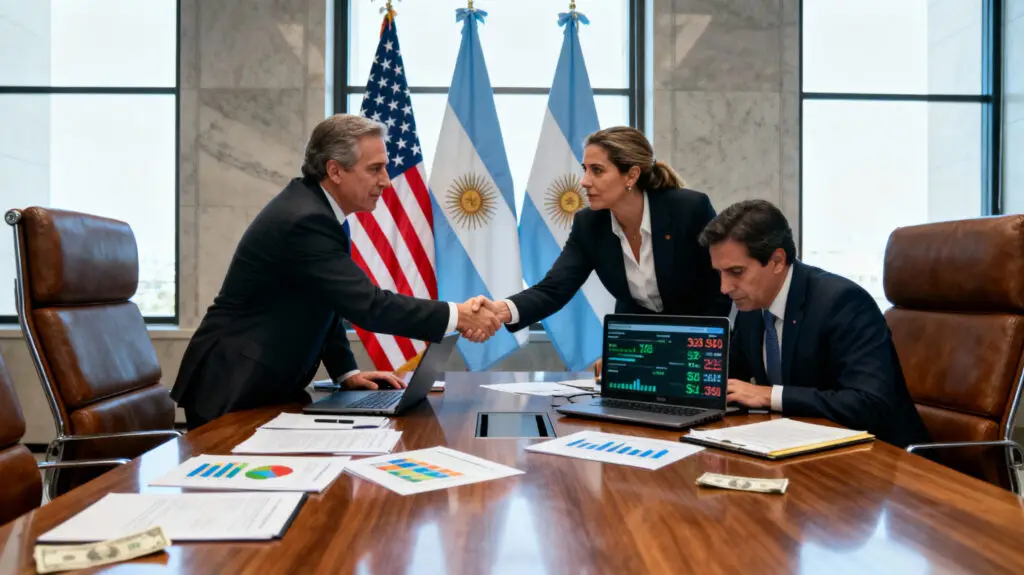US Treasury Steps In To Calm Argentina’s Currency Crisis
The United States has taken unprecedented action by purchasing Argentine pesos to help stabilise the nation’s struggling economy. Treasury Secretary Scott Bessent announced the move on social media, confirming that a $20 billion financial package has been finalised. The decision aims to calm Argentina’s ongoing currency crisis and restore investor confidence amid rising inflation. However, the move has also sparked political controversy both in the United States and abroad.

$20 Billion Financial Rescue Marks Major Intervention
The Treasury Department’s support package includes a currency swap line allowing Argentina to exchange pesos for US dollars. This program is designed to strengthen Argentina’s reserves ahead of crucial debt repayments due in the coming months. Bessent emphasised that the initiative represents a strategic safeguard for US economic interests in the Western Hemisphere. Despite market optimism, many critics argue the move risks domestic backlash during a time of fiscal tightening.
Political Reactions Intensify In The United States
The financial rescue has ignited debate among US lawmakers across party lines. Democratic Senator Elizabeth Warren criticised the decision, saying funds should prioritise American healthcare and domestic spending. Republican voices, including Senator Chuck Grassley, questioned why the US would support Argentina while American farmers face reduced soybean demand. The controversy underscores deep divisions over the balance between foreign aid and national economic priorities.
Milei’s Reform Agenda Gains Support And Scrutiny
Argentine President Javier Milei, a vocal ally of former US President Donald Trump, has welcomed the American assistance. Since taking office in 2023, Milei has implemented sweeping deregulation and austerity measures aimed at achieving a fiscal surplus. While these reforms have impressed international investors, they have also triggered domestic unrest and declining purchasing power. The financial aid could help stabilise Argentina’s peso, but it also places Milei under greater global scrutiny.
Economic Conditions Deteriorate Ahead Of Elections
Argentina’s economic situation has worsened in the lead-up to national midterm elections scheduled for October 26. The peso has suffered sharp devaluation in recent months, while capital outflows have increased amid investor uncertainty. Efforts to stabilise markets have depleted national reserves, raising fears of another potential default. The $20 billion US intervention provides temporary relief but does not eliminate underlying structural risks within the economy.
Market Response Shows Short-Term Optimism
Following the announcement, Argentine debt and currency markets reacted positively, with the peso briefly strengthening against the US dollar. International investors interpreted the US move as a signal of confidence in Argentina’s long-term reform trajectory. Treasury Secretary Bessent stated that Argentina’s economic stability is of systemic importance to the Western Hemisphere. Analysts, however, warned that sustained progress will depend on domestic reforms rather than external bailouts.
Historical Context Highlights Repeated Financial Struggles
Argentina’s current financial troubles are part of a recurring pattern of debt and default crises. The country has defaulted three times since 2001, most recently in 2020 amid pandemic-related disruptions. Bessent, known for his involvement in the 1992 Black Wednesday currency crisis, has emphasised his understanding of monetary market interventions. He insists the peso remains undervalued and that decisive action could prevent a wider regional economic fallout.
Critics Question US Strategic Priorities
Opponents of the intervention argue that Washington’s involvement prioritises political alliances over fiscal prudence. Some have suggested that investors with ties to the Treasury Secretary, such as Robert Citrone, could benefit from the plan. Bessent dismissed these claims, stating that the program supports American strategic interests and prevents potential instability near US borders. Nonetheless, the optics of aiding a foreign ally during domestic budget cuts remain contentious.
Partnership Strengthens US-Argentina Relations
Despite the controversy, the aid package marks a strengthening of diplomatic and economic ties between Washington and Buenos Aires. President Milei expressed gratitude to both Trump and Bessent, calling the collaboration a symbol of shared commitment to economic freedom. The partnership reinforces the notion of Argentina as a key regional ally in advancing market-based reforms. As global attention turns to South America, this rescue effort could reshape international perspectives on financial diplomacy.
US Role In Regional Stability Under Continued Debate
While the intervention has boosted short-term optimism, long-term questions about sustainability persist. Analysts caution that without meaningful structural reform, Argentina risks reverting to economic instability once funding runs out. For the United States, the move underscores a strategic balancing act between supporting allies and addressing domestic concerns. The world now watches closely to see whether this bold financial rescue becomes a stabilising milestone or another costly experiment in global economics.

















